Wild Yam Root Private Label Contract Manufacturer | Your Brand Partner
Partner with a trusted Wild Yam Root private label contract manufacturer. Expert support for custom formulations, compliance, and reliable supply chain.
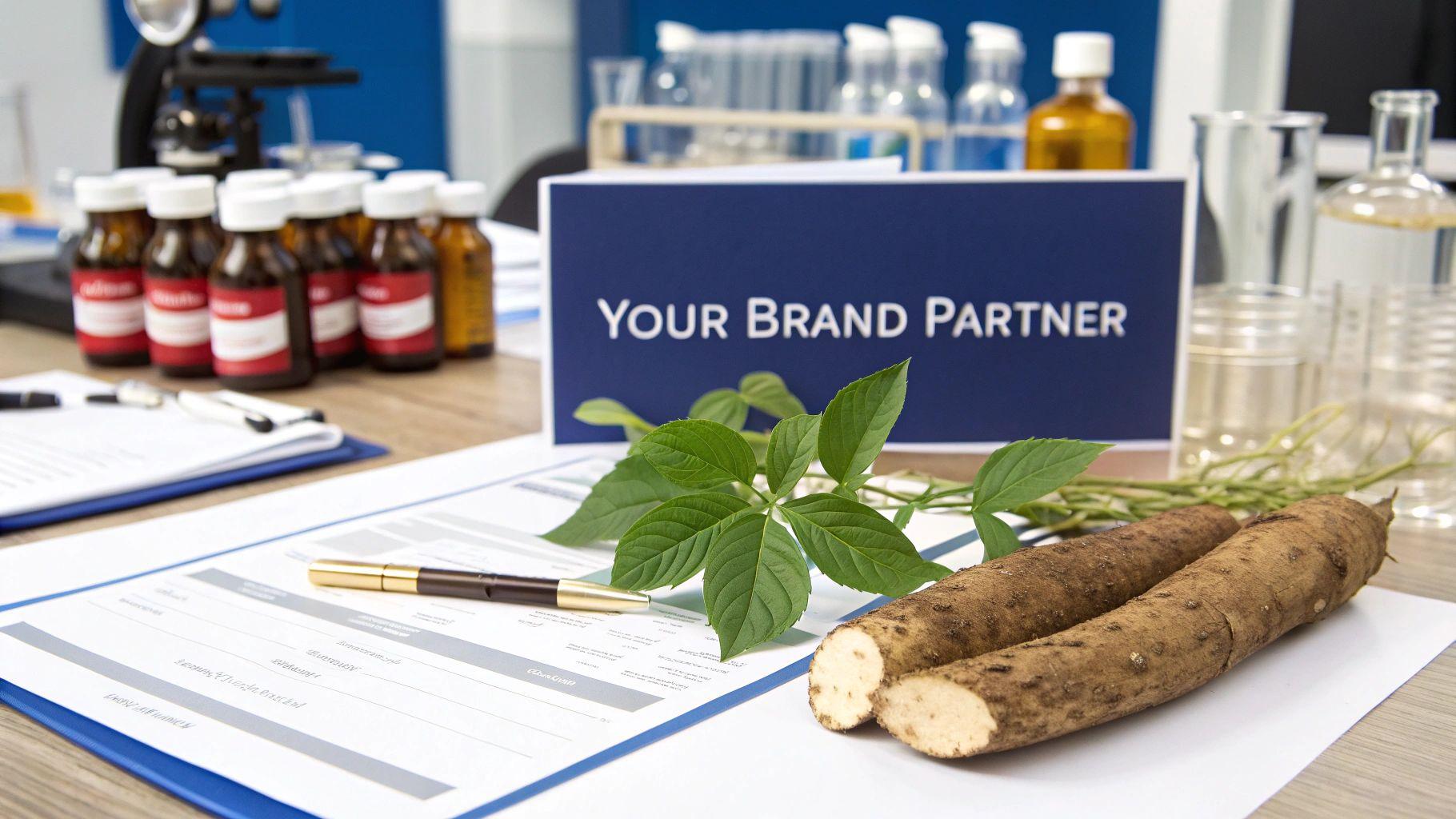 Get a Free Quote Today!
Get a Free Quote Today!A wild yam root private label contract manufacturer is your ticket to launching custom liquid herbal supplements. Think of us as the complete operational backbone for your brand. We handle the tricky business of sourcing raw materials, ensuring every batch has consistent potency, and navigating the labyrinth of regulatory demands—all without you needing to build a production facility from the ground up.
Why Your Manufacturing Partner Is Your Most Important Decision
Jumping into the wild yam root market is a smart move. You're tapping into a growing consumer base hungry for natural wellness solutions. In fact, the global wild yam powder market is on a serious growth trajectory, projected to climb from USD 190.9 million in 2025 to a whopping USD 447.8 million by 2035.
That's a compound annual growth rate of about 8.8%. It’s a clear signal of strong, lasting consumer interest.
This growth is a massive opportunity, but it also means the space is getting more crowded. Your success hinges on picking the right manufacturing partner. You need someone who is more than just a supplier; you need an extension of your own team—your R&D partner from concept through launch.
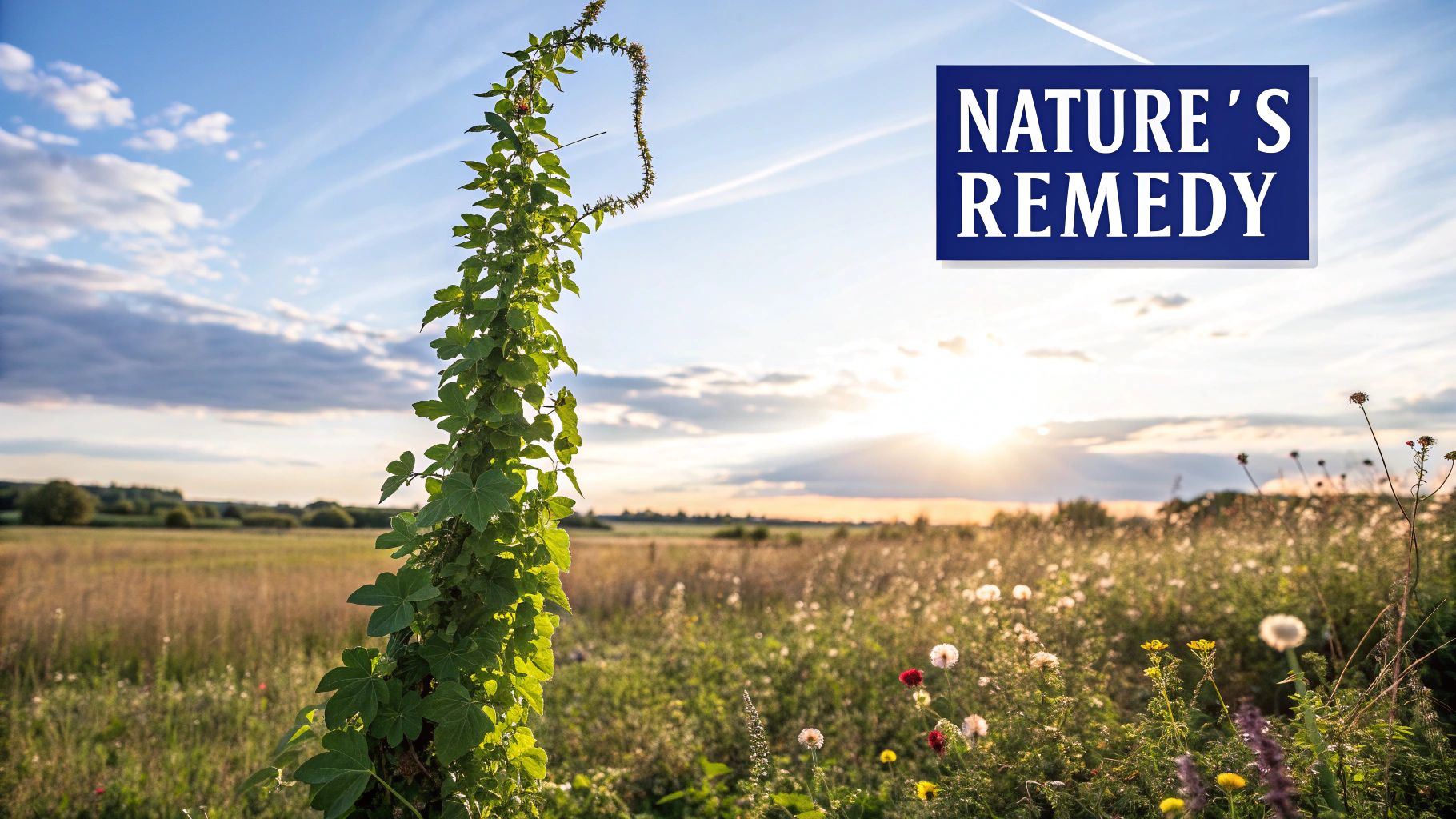
Beyond Production: The Partnership Mindset
The best partnerships are built on real collaboration, not just purchase orders. A true partner brings deep botanical expertise to the table, helping you navigate the complexities of wild yam root, a notoriously tricky ingredient to work with. Our job is to make sure your final product isn't just compliant but is also genuinely effective and perfectly aligned with your brand's vision.
Here’s the dynamic: you bring the brand story and the marketing muscle. We bring the scientific rigor, quality control, and production power. That synergy is what separates breakout brands from the ones that fizzle out. You can dive deeper into choosing the right manufacturer in our detailed guide.
A great partner obsesses over the details that impact your brand’s reputation:
- Customization & Flexibility: We work with you on a custom formula, not just push a pre-made one. This includes giving solid advice on advanced extraction methods and complementary ingredients that create a superior product.
- Supply Chain Transparency: You should always know where your wild yam root comes from. We trace it from harvest to bottle, guaranteeing quality and sustainable practices.
- Quality & Compliance: This is non-negotiable. We operate a cGMP, UL certified, and FDA-registered facility. This protects your brand from the serious risks of non-compliance.
Your contract manufacturer is your quality gatekeeper. Their commitment to excellence in sourcing, testing, and production directly translates into customer trust and repeat business for your brand.
The Contract is Key to a Strong Partnership
Before getting too far down the road with any potential partner, you have to talk contracts. A formal, detailed agreement protects both you and the manufacturer, setting crystal-clear expectations for timelines, costs, and quality standards from day one.
While it’s a broad business principle, understanding the importance of a signed contract is absolutely critical here. This isn't just a piece of paper; it's the foundation of your partnership. Getting this right prevents costly misunderstandings later and builds a reliable framework for long-term success.
To help you stay focused on what's most important during your search, here's a quick checklist of the critical points to evaluate.
Key Partner Vetting Checklist
| Evaluation Criteria | Why It Matters for Your Brand |
|---|---|
| Certifications (cGMP, UL, FDA) | This is non-negotiable proof of quality, safety, and regulatory adherence. It protects you from legal and reputational risk. |
| Ingredient Sourcing Transparency | Ensures you're getting high-quality, ethically sourced wild yam root, which is a cornerstone of your product's story and efficacy. |
| Formulation Expertise | A partner with deep botanical knowledge can help you create a superior, more effective product that stands out in a crowded market. |
| Clear Communication & Support | You need a responsive point of contact. Poor communication can lead to production delays, errors, and endless frustration. |
| Scalability & Production Capacity | Can they grow with you? Ensure they can handle your initial pilot run and your future large-scale production needs without a hitch. |
Think of this checklist as your guide. A potential partner who can confidently check every one of these boxes is one worth building a relationship with. Don't settle for less—your brand's future depends on it.
Making Sense of Essential Certifications and Compliance
In the supplement game, certifications aren't just fancy logos. Think of them as the steel frame of your brand's reputation and your first line of defense against legal trouble. When you're looking for a Wild Yam Root private label contract manufacturer, knowing what these credentials actually mean is the difference between a successful launch and a catastrophic recall.
Anyone can rent a warehouse and buy blending equipment. A genuine manufacturing partner, however, invests heavily in building a culture of compliance that protects you, the brand owner. This goes way beyond just having a certificate hanging on the wall.
Decoding the Alphabet Soup of Quality
As you vet potential partners, you'll encounter a few key acronyms. Let's break down what they mean for your business and your customers.
-
cGMP (Current Good Manufacturing Practices): This is the absolute, non-negotiable baseline. Enforced by the FDA, cGMP rules dictate everything from how raw materials are handled to equipment sanitation and final product testing. A cGMP-compliant facility proves your manufacturer operates with meticulous, documented consistency. No cGMP, no deal. It's that simple.
-
FDA-Registered Facility: This means the facility has officially registered with the U.S. Food and Drug Administration, putting them on the FDA's radar for inspections. While registration itself isn't an "endorsement" from the FDA, it's a mandatory requirement for anyone making supplements for the U.S. market. If a potential partner isn't registered, they aren't a legitimate option.
-
UL Certification: This is an extra layer of trust. UL is a globally respected third-party certification company. When a manufacturer voluntarily gets UL certified, they're inviting outside auditors to scrutinize their processes against standards that often go above and beyond basic cGMP requirements. It’s a clear signal they’re proactive about quality.
A manufacturer who truly lives a culture of compliance doesn't just scramble to pass audits. They use those high standards as their daily playbook. Their team is trained to think about quality at every single step, from the moment a shipment arrives to the second it leaves their dock.
Why Third-Party Testing is Your Ultimate Safety Net
Certifications set the rules, but independent testing provides the proof. This is especially critical for a botanical ingredient like wild yam root.
The active compound your customers are looking for is diosgenin. Its concentration can vary widely depending on where the plant was grown, when it was harvested, and how it was processed. A reliable manufacturer knows this and doesn't just take their supplier's word for it. They have a strict, third-party testing protocol in place.
A Real-World Testing Scenario
Imagine two manufacturers receive a new shipment of wild yam root powder.
-
Manufacturer A does a quick visual check, glances at the supplier's paperwork, and sends the raw material straight into production. They’re operating on pure trust—a risky bet.
-
Manufacturer B immediately quarantines the shipment. They pull samples and send them to an independent, third-party lab for a full battery of tests. That material doesn't go near the production floor until the lab results are back and verified.
The second approach is the only one you should accept. At a minimum, that lab analysis must confirm two things:
-
Potency and Identity: This is where they use High-Performance Liquid Chromatography (HPLC) to confirm the material is actually Dioscorea villosa (wild yam) and to measure the exact percentage of diosgenin. This ensures your final product meets its label claim and actually works.
-
Purity and Safety: The lab also screens for heavy metals (like lead, arsenic, and mercury), pesticides, and microbiological contaminants (like E. coli and Salmonella).
This rigorous, upfront testing is what separates the pros from the amateurs. It guarantees that only pure, potent, and safe ingredients ever make it into your product. When you ask a potential Wild Yam Root private label contract manufacturer for a recent Certificate of Analysis (CofA), you’re not being difficult—you’re being a smart, responsible brand owner.
Bringing Your Custom Wild Yam Root Formula to Life
Your vision for a wild yam root supplement is unique, so why settle for a generic formula? A true manufacturing partner doesn't just fill bottles; they become an extension of your R&D team, working with you to translate your brand's ethos into a tangible, effective liquid supplement.
This is a collaborative process, moving beyond basic concepts to make the critical decisions that will define your product. The goal is to create something that's not just market-ready, but perfectly aligned with your customers' needs and your business goals.
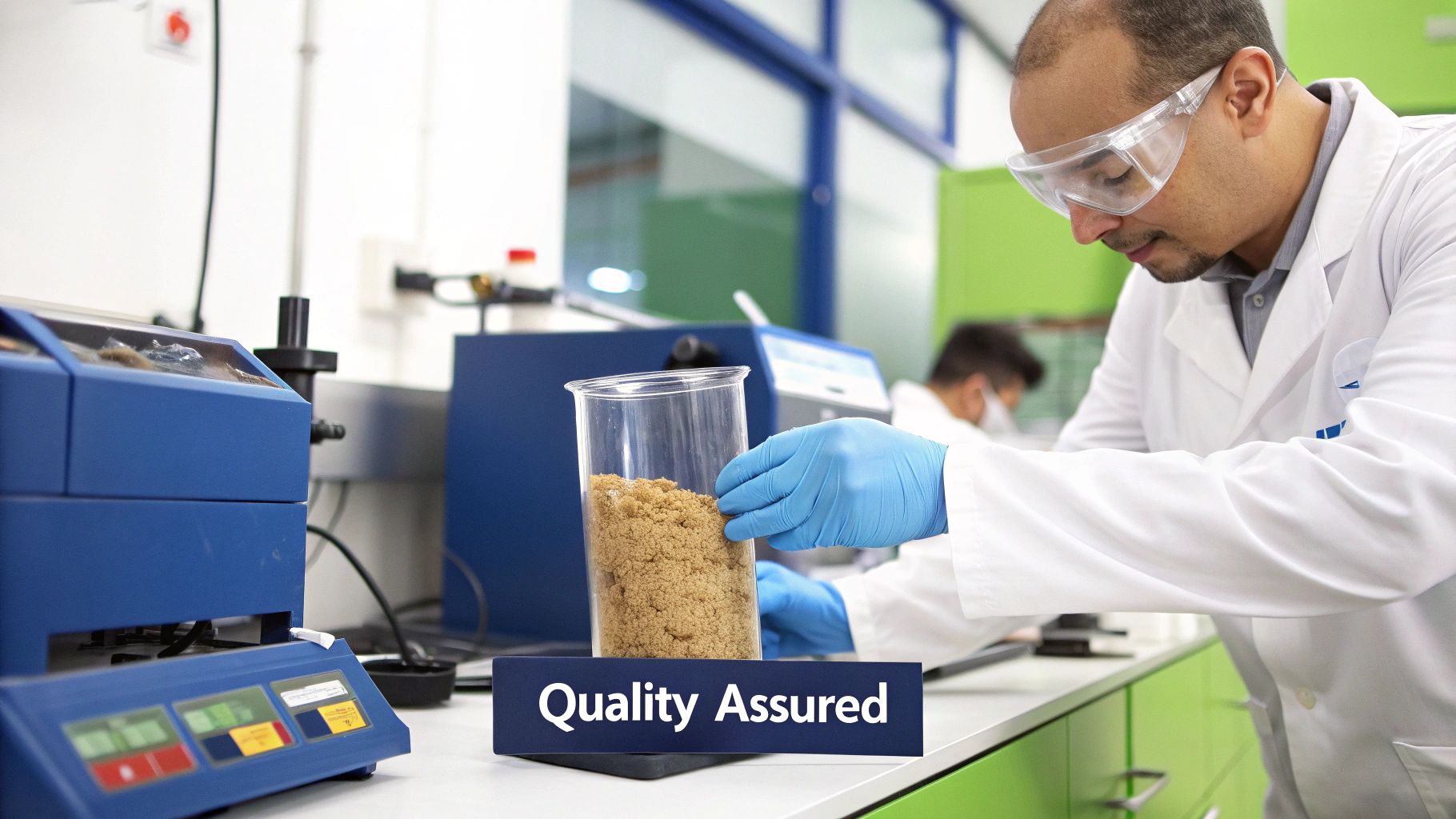
Choosing the Right Extraction Method
One of the first and most important decisions you'll make with your Wild Yam Root private label contract manufacturer is how to pull the active compounds from the raw botanical. This choice profoundly impacts your supplement's final character and efficacy.
There are two primary paths, each with distinct advantages:
- Alcohol Extraction: A classic, powerful method. It's excellent for drawing out a broad spectrum of a plant's chemical compounds, resulting in a potent, highly shelf-stable tincture.
- Glycerin Extraction: For an alcohol-free alternative, glycerin is a gentler solvent. This process creates a sweeter-tasting final product called a glycerite, often the go-to for consumers sensitive to alcohol.
Your choice here isn't just technical—it influences everything from potency and taste to your marketing angle. An alcohol-free formula can be a major selling point for certain demographics.
Selecting Synergistic Botanicals
Wild yam root is a powerhouse on its own, but its benefits can often be amplified when paired with other complementary herbs. This is where your manufacturer's formulation expertise really shines. They should be able to recommend botanicals that work in harmony with wild yam to target specific wellness goals.
For instance, if you're building a product for hormonal balance, you might consider adding:
- Chaste Tree Berry (Vitex): A go-to for supporting a healthy menstrual cycle.
- Black Cohosh: Another hugely popular herb in women's wellness formulas.
- Dong Quai: A staple in traditional Chinese medicine for female health.
A knowledgeable partner will guide you through proper dosages, potential interactions, and quality sourcing for these additional ingredients, ensuring the final formula is both safe and effective. To see how these elements fit into the bigger picture, check out our comprehensive guide for starting your own private label liquid supplement brand.
Crafting a Winning Flavor Profile
Let's be honest: with liquid supplements, taste is king. A product can be incredibly effective, but if your customers can't stand the flavor, you won't see many repeat purchases. A good manufacturer will have a library of natural flavors and sweeteners to help mask the sometimes-earthy notes of botanicals.
Your product's flavor is a crucial part of the user experience. A great contract manufacturer will provide multiple flavor samples for you to test, allowing you to fine-tune the taste until it's perfect for your target audience.
The demand for these products is strong, and the manufacturing landscape reflects that. The global wild yam root market was valued at around USD 612.4 million in 2024, driven largely by the women's wellness sector. This commercial momentum pushes expert manufacturers to provide tailored solutions—like alcohol-free glycerin extracts for topical applications—to meet precise private label needs.
The Importance of Production Flexibility
Finally, a top-tier partner understands that brands need to scale intelligently. You need a manufacturer that offers flexibility in production run sizes. This adaptability is non-negotiable for smart, sustainable growth.
Your manufacturing partner should be able to support you at every stage:
- Pilot Runs: Starting with small batches of 500–1,500 units is perfect for a launch. You can test market response or get samples to influencers without a massive upfront investment.
- Full-Scale Production: As your brand takes off and demand skyrockets, they must have the capacity to seamlessly scale your production runs to tens of thousands of units. This ensures you never have to deal with the dreaded "out of stock" notice.
This kind of flexibility allows you to be agile, respond to market feedback, and manage your inventory without tying up all your capital. It's one of the key features that separates a simple supplier from a true strategic partner who's invested in your long-term success.
How Modern Extraction Tech Defines Your Product's Quality
The final quality of your wild yam root supplement is decided long before it ever touches a bottle. It’s determined by the science and technology your manufacturing partner uses to process the raw botanicals. Partnering with a forward-thinking Wild Yam Root private label contract manufacturer is a direct investment in a more potent and effective product. Why? Because their technology preserves the plant's delicate active compounds.
Old-school methods often used high heat, which can destroy diosgenin—the very compound your customers are looking for. Thankfully, premier manufacturers have moved far beyond these dated techniques.
The Power of Cold-Fill Processing
One of the biggest game-changers is cold-fill processing. This technique involves processing and bottling the liquid supplement without high heat, which is critical for preserving the integrity of heat-sensitive phytonutrients and enzymes found in wild yam root.
By avoiding this thermal stress, the botanical extract stays as close to its natural state as possible. You end up with a supplement that has a much richer profile of active compounds, delivering the full potency your customers expect. It’s a direct investment in the efficacy of your product.
When you're vetting a partner, get specific. Ask about their filling process. A manufacturer that champions cold-fill technology is showing a serious commitment to producing a superior, high-potency supplement.
Bio-Chelation: A Smarter Way to Extract
Another huge technological leap is found in advanced extraction methods like bio-chelation. This is a sophisticated, cold-extraction process that uses natural solvents—like alcohol or glycerin—to gently pull out the full spectrum of active constituents within the wild yam root.
Unlike harsher methods that might just isolate specific compounds, bio-chelation aims for a holistically balanced extract that mirrors the plant's natural chemical fingerprint. This approach captures not just the main active ingredients but also the supporting co-factors that can enhance bioavailability and overall effectiveness.
This is exactly where the science of botanical manufacturing directly impacts your success. The wild yam extract market is evolving quickly, and better cold-extraction and bio-chelation techniques are leading the charge. These precise methods also make standardization possible, helping to achieve the consistent diosgenin levels needed to meet regulatory and consumer demands. You can dig deeper into these evolving market standards and techniques for wild yam extract.
Why This Technology Matters for Your Brand
Choosing a manufacturer isn't just about finding someone who can mix and bottle ingredients. It's about finding a partner who uses modern science to create a product that genuinely stands out. A Wild Yam Root private label contract manufacturer that invests in these advanced technologies gives you a serious competitive edge:
- Higher Potency: Cold processing preserves delicate compounds like diosgenin, making your supplement as effective as possible.
- Enhanced Stability: Gentle extraction methods often result in a more stable product with a longer, more reliable shelf life.
- Superior Quality: This commitment to technology is a clear sign of a manufacturer's dedication to excellence.
- A Stronger Marketing Story: You can confidently tell customers your product is made with state-of-the-art methods designed to protect the plant's natural power.
The technology in your partner’s facility becomes a core feature of your product. By understanding these modern processes, you can ask smarter questions and confidently pick a partner equipped to produce a truly premium supplement.
Managing Timelines and Supply Chain Reliability
You can have the most brilliant formula in the world, but none of it matters if your product is perpetually stuck in production. Getting your wild yam root supplement into customers' hands quickly and predictably is everything. This is where your Wild Yam Root private label contract manufacturer shows their true worth through speed and reliability.
A true partner treats your launch schedule like their own, giving you clear, realistic timelines from the very first conversation.
This graphic breaks down the fundamental compliance steps that are the bedrock of any solid manufacturing timeline.
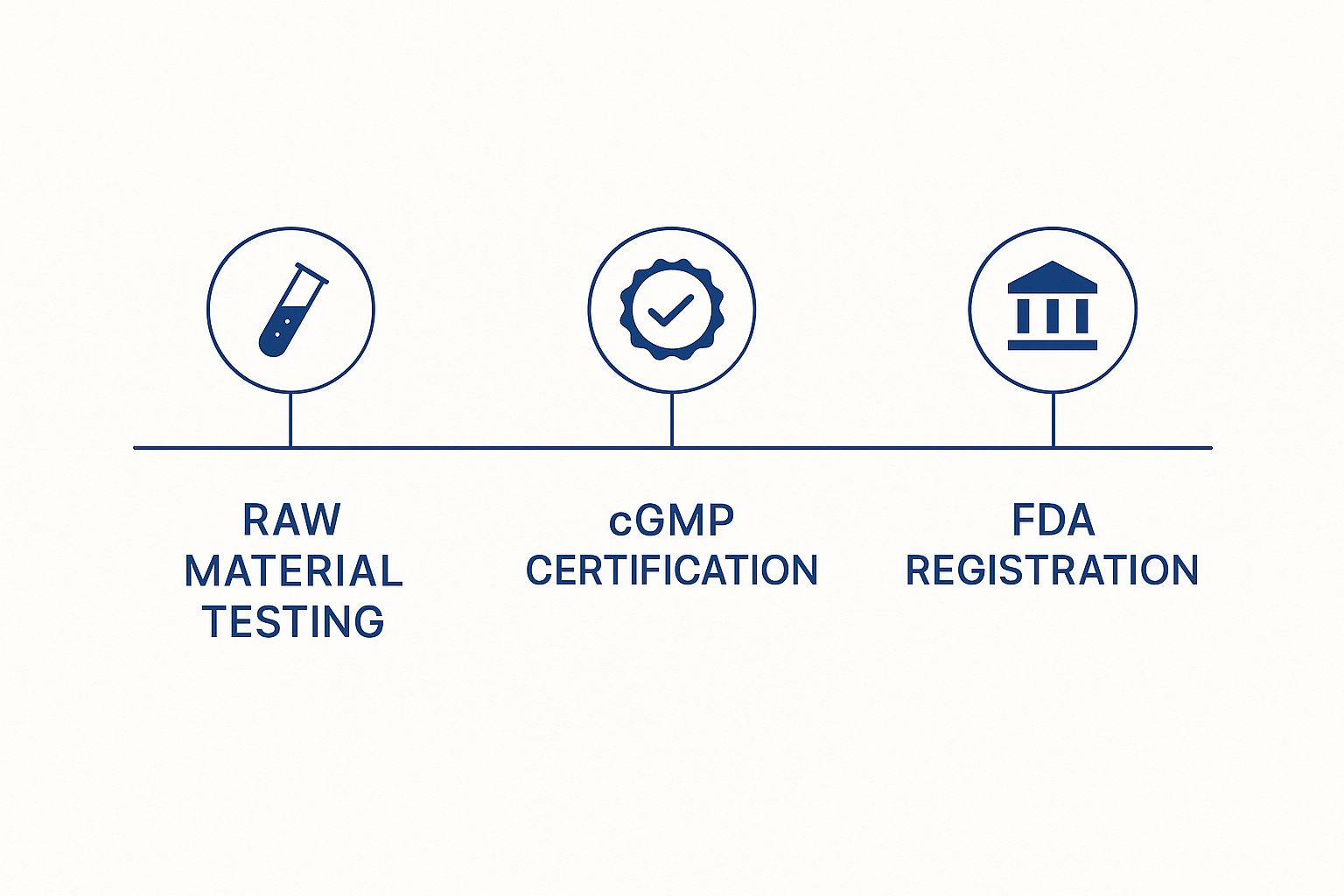
Think of each of these milestones—from verifying raw materials to keeping facility certifications current—as a critical checkpoint. They’re what prevent costly, unexpected delays and keep your project moving forward smoothly.
Mapping a Realistic Production Timeline
A common question we get is, "How long is this actually going to take?" A well-oiled manufacturer should hand you a clear project map right away. This transparency is gold. It helps you confidently plan marketing campaigns, line up logistics, and manage inventory.
Let’s walk through what a typical private label project looks like, from the first handshake to the final shipment.
Typical Private Label Project Timeline
This table gives you a bird's-eye view of the key phases and their general duration.
| Phase | Typical Duration | Key Activities and Decisions |
|---|---|---|
| 1. Discovery & Formulation | 1–3 Weeks | You'll finalize your exact formula, decide on flavor profiles, and approve initial R&D samples. Your clear, decisive feedback is key to keeping things on track. |
| 2. Component Sourcing | 2–6 Weeks | Your manufacturer will source all necessary parts—raw botanicals, bottles, caps, and droppers. Lead times can vary depending on the global supply chain. |
| 3. Label & Packaging Design | 1–2 Weeks | You hand over the final, print-ready artwork for your labels. Pro tip: Use the specific die-lines provided by the manufacturer to avoid printing errors. |
| 4. Pilot or Production Run | 2–4 Weeks | This is where it all comes together. Your product gets batched, blended, bottled, and labeled, all while following strict cGMP standards. |
| 5. Quality Control & Testing | 1–2 Weeks | The finished product goes for final third-party testing to double-check potency and purity, generating the all-important Certificate of Analysis (CofA) for your batch. |
| 6. Shipping & Fulfillment | 1 Week | Once testing is complete, your finished product is packed and shipped to your designated warehouse or fulfillment center. |
All in, you're usually looking at a timeline of 8 to 12 weeks from start to finish. This highlights why it pays to work with experienced supplement contract manufacturers who have dialed in these steps for a seamless, efficient workflow.
Assessing Supply Chain Transparency and Reliability
A timeline on paper is one thing; sticking to it is another. A manufacturer's ability to hit deadlines hinges on how well they manage their supply chain. This is especially true for botanicals like wild yam root, which can face sourcing challenges.
A reliable partner doesn't just give you a delivery date; they give you visibility. They should be able to tell you where your raw materials are coming from and have contingency plans for potential supply chain disruptions.
When you're vetting a potential Wild Yam Root private label contract manufacturer, press them on these points:
- On-Time Delivery Record: Ask for their on-time delivery percentage over the last year. A manufacturer proud of their record will have this data ready.
- Communication Protocols for Delays: What happens when things go wrong? You want a partner who calls you with a solution, not one you have to chase for updates.
- Supply Chain Redundancy: Do they have backup suppliers for your wild yam root, bottles, or caps? Relying on a single source for anything critical is a huge red flag.
To make sure your operation is solid from the factory floor to your customer's door, it's smart to brush up on strategies for effective supply chain management. A manufacturer who already gets these principles is far better equipped to get your product to you on schedule.
Ultimately, picking a partner with a proven track record for reliability isn’t just about convenience—it’s a core business strategy that protects your launch, your brand's reputation, and your bottom line.
Answering Your Top Manufacturing Questions
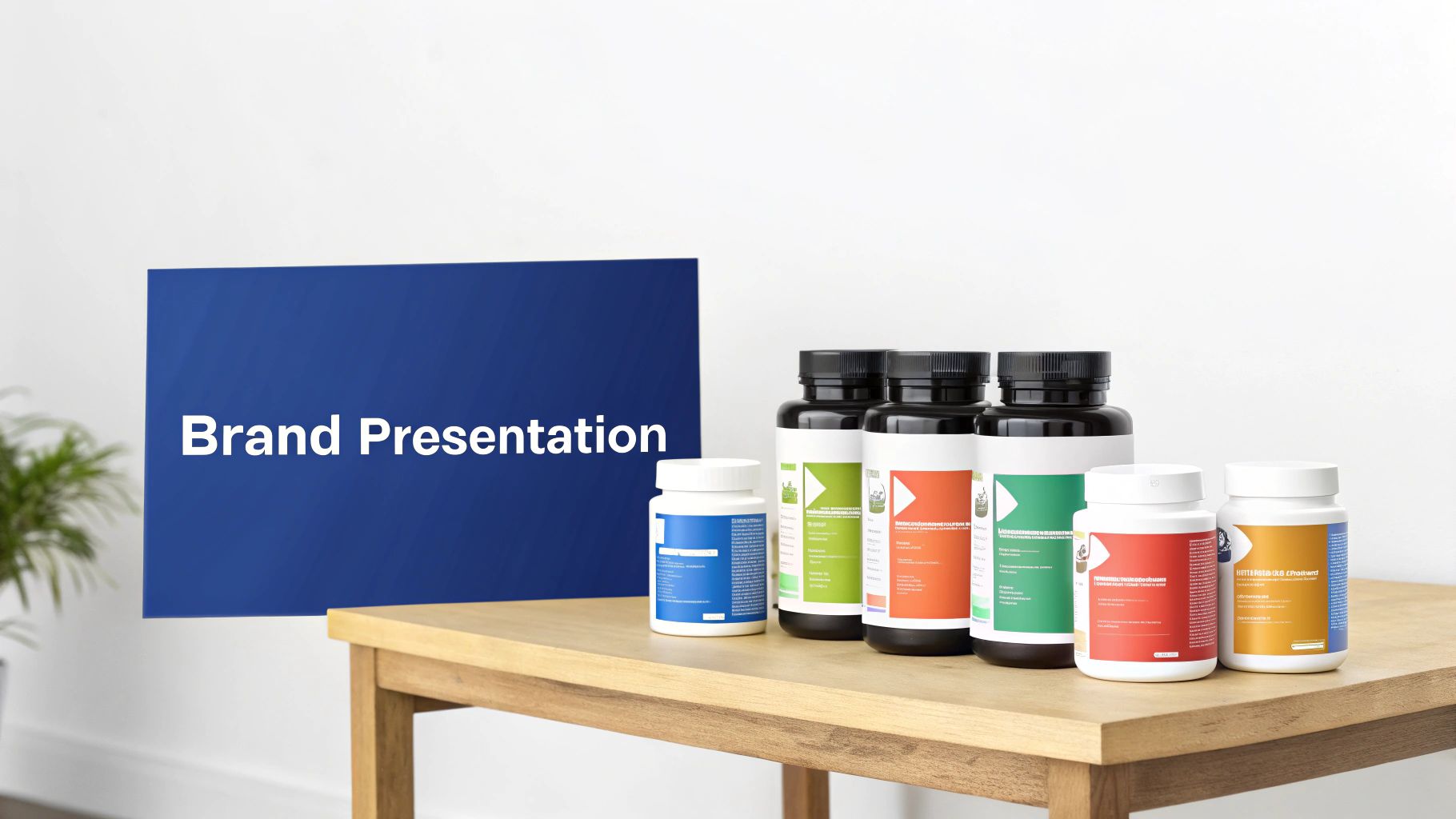
As you get closer to choosing a partner, you're going to have specific, practical questions. Getting straight answers is the only way to make a decision you feel good about. Let's tackle some of the most common—and critical—questions brand owners ask when looking for a Wild Yam Root private label contract manufacturer.
My goal is to cut through the fluff and give you the real-world insights you need to move forward.
What Are Typical Minimum Order Quantities?
Minimum Order Quantities (MOQs) are all over the map, and this one number can make or break a potential partnership. You have to find a partner whose production scale fits your business plan.
For a startup or a brand testing a new product, look for a flexible partner. Many growth-focused manufacturers offer pilot runs as low as 500 to 1,500 units. This is the sweet spot—it lets you get to market without drowning your capital in inventory.
On the flip side, you'll run into larger, rigid operations that won't talk to you for less than 3,000 to 5,000 units. For many brands, that's not a realistic starting point.
The real question isn't about the starting MOQ—it's about scalability. You need to ask, "Can you grow with me?" A great partner can take you from that initial 500-unit run all the way to 50,000 units without a hitch.
This strategy protects your cash flow and ensures you don't have to go searching for a new manufacturer right when your brand is hitting its stride.
How Is Diosgenin Potency Kept Consistent?
This is where the rubber meets the road on quality. With a botanical extract like wild yam root, consistency in the active compound—diosgenin—is everything. A top-tier manufacturer doesn't hope for the best; they have a bulletproof process to guarantee it.
It all begins with obsessive sourcing from vetted raw material suppliers. From there, a solid quality control protocol looks like this:
- Incoming Inspection: Raw wild yam root is tested for both identity and potency before it’s allowed through the door. If it doesn't meet spec, it gets rejected.
- Standardized Extraction: They use controlled, repeatable methods (like bio-chelation) to pull the diosgenin from the raw material, ensuring the process is the same every single time.
- Finished Product Testing: The final, bottled product is sent to an independent, third-party lab to verify that the diosgenin content is exactly what you're claiming on your label.
Don't be shy. Ask to see a Certificate of Analysis (CofA) from a recent production run. That piece of paper is your proof that their quality system is more than just talk.
Can I Supply My Own Packaging and Labels?
Absolutely. You've probably spent a ton of time sourcing the perfect bottle or working with a designer on a label you love. Any good contract manufacturer will be flexible enough to work with your supplied components.
While they all offer turnkey services (handling everything from bottles to boxes), a true partner accommodates your vision.
Just bring this up at the beginning of your conversation. A smart partner will want to see samples of your bottles and caps to make sure they'll run smoothly on their automated production lines.
They'll also ask for your label artwork to check it against their specific die-lines. This simple step prevents incredibly expensive printing mistakes and ensures your label is fully compliant with regulations. This kind of collaborative double-check is a sign you're dealing with an experienced Wild Yam Root private label contract manufacturer who’s focused on getting it right the first time.
Ready to turn your vision for a premium wild yam root supplement into a market-ready reality? At Triton Nutra Group, we act as your dedicated R&D and production partner, guiding you from concept to launch with expertise and transparency. Request a free consultation today and let's build your brand together.